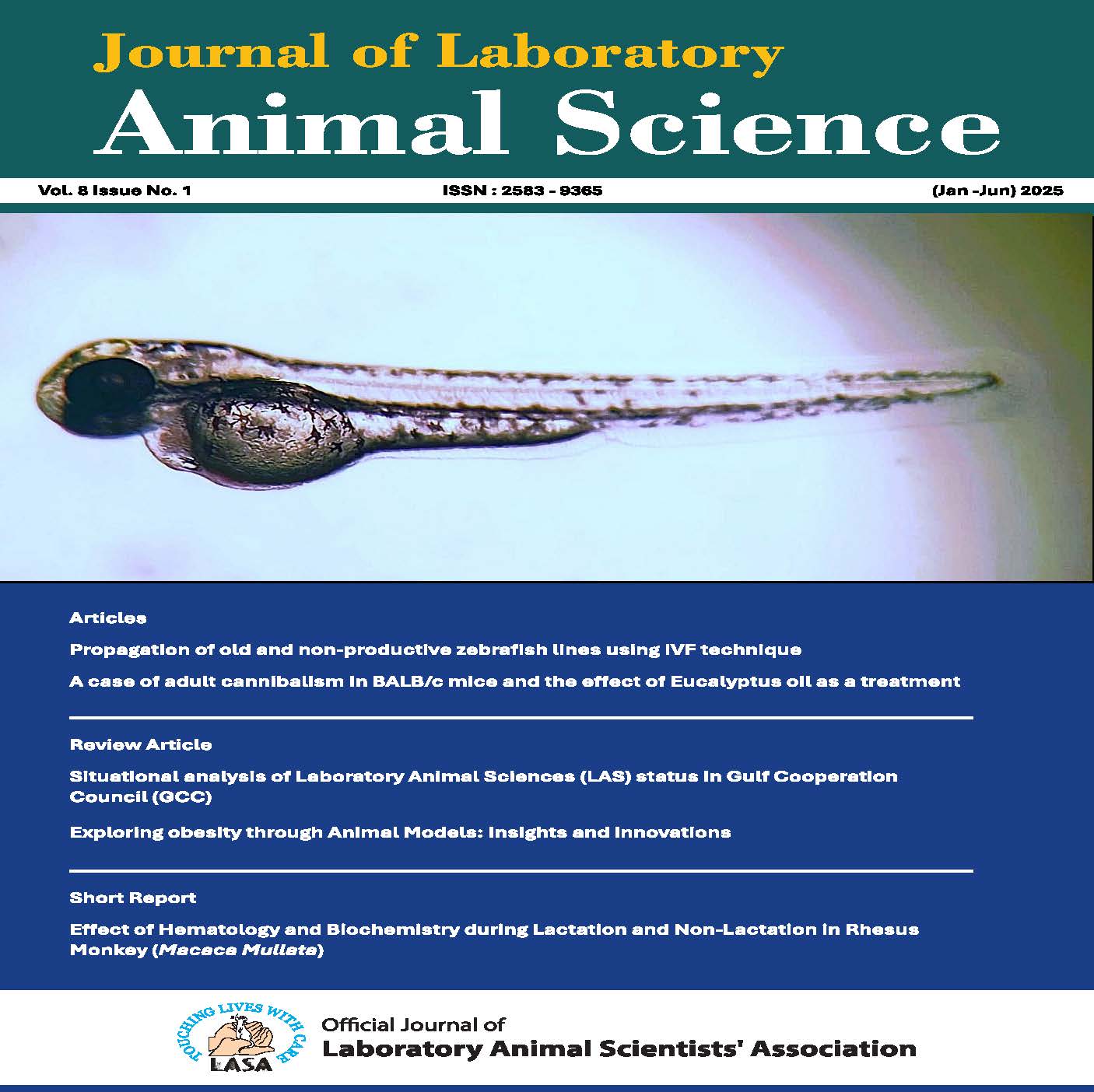Situational analysis of Laboratory Animal Sciences (LAS) status in Gulf Cooperation Council (GCC).
DOI:
https://doi.org/10.48165/jlas.2025.8.1.3Keywords:
Gulf Cooperation Council, Laboratory Animal Sciences, Animal WelfareAbstract
Laboratory Animal Sciences play a pivotal role in scientific research, significantly contributing to various fields such as medicine, biology, and toxicology. This discipline is crucial in advancing scientific knowledge, improving healthcare outcomes, and ensuring animals’ ethical and responsible use in research. Animal health is paramount in this field, yet it is sometimes neglected during experimentation. To address this concern, many countries have developed their regulations for animal welfare. Moreover, globally, the WOAH (World Organisation for Animal Health) has introduced guidelines and regulations mandating research organizations to prioritize animal health. An international organization is ICLAS (International Council for Laboratory Animal Science) which is dedicated to advancing laboratory animal science worldwide, promoting the ethical use of animals in scientific research, and ensuring their welfare. In conjunction with ICLAS, several other organizations share responsibilities for promoting good animal practices globally. This paper provides a comprehensive overview of the Laboratory Animal Sciences within the GCC countries. A brief infrastructure detail that supports animal welfare and the significance of these facilities in facilitating cutting-edge re search is explored, alongside an analysis of the accreditation and management protocols crucial for their effective op - eration. Additionally, the paper scrutinizes the current laws and regulations governing laboratory animal welfare and experimentation in the GCC region. As a forward-looking contribution, the paper outlines prospective developments and expansion opportunities for laboratory animal sciences in the GCC, aiming to propel scientific advancements in the region. This research provides a valuable resource for scientists, policymakers, and stakeholders invested in promoting ethical and effective laboratory animal research practices in the Gulf region.
Downloads
References
Barré‐Sinoussi, F., & Montagutelli, X. (2015). Animal models are essential to biological research: issues and perspectives. Future Science OA, 1(4). https://doi.org/10.4155/fso.15.63 Miziara, I. D., De Matos Magalhães, A. T., Santos, M. D., Gomes,
E., & De Oliveira, R. A. (2012). Ética da pesquisa em mod elos animais. Brazilian Journal of Otorhinolaryngology, 78(2), 128–131. https://doi.org/10.1590/s1808- 86942012000200020
Acıduman, A., & Aşkit, Ç. (2022). Ibn Zuhr (Avenzoar) on head wounds in Kitāb al-Taysīr (Liber Teisir). World Neurosurgery, 161, 6–15. https://doi.org/10.1016/j. wneu.2022.01.057
Akmal, M., Zulkifle, M., & Ansari, A. (2010). Ibn nafis - a for gotten genius in the discovery of pulmonary blood circu lation. Heart views: the official journal of the Gulf Heart Association, 11(1), 26–30.
Shehnaz, S. I., & Agarwal, A. K. (2014). Laboratory Animal Sciences training in Gulf Co-operation Council Countries: Think globally, act Locally. Atla-alternatives to Laboratory Animals, 42(1), P2–P3. https://doi. org/10.1177/026119291404200114
Mohr B, Fakoya FA, Hau J, Souilem O, Anestidou L. The gover nance of animal care and use for scientific purposes in Africa and the Middle East. Ilar Journal. 2017 May 1;57(3):333–46. Available from: https://doi.org/10.1093/ilar/ilw035.
19 Journal of Laboratory Animal Science, 8(1): , Jan-Jun 2025
Animal House. King Abdulaziz University. Available online: https://kfmrc.kau.edu.sa/Content-141-EN-276889#labs. Accessed on 8th November 2023.
College of Science- Animal House Unit. Taif University. Accessed online: www.tu.edu.sa/En/College-of-Science/97/ Pages/21068/Animal-House-Unit. Accessed on 16th September 2023.
Animal house unit. King Saud University. Experimental Surgery دبع نب فيان ريمأل زكرم | Laboratory) ESAL (Animal and زيزعال ثاحبألل ةيحصال) ksu.edu.sa). Accessed on 16th December 2023.
Core labs. King Abdullah University of Science and Technology. Available online: Animal Resources Core Lab (kaust.edu. sa). Accessed on 18th September 2023.
AAALAC accreditation, King Faisal Specialist Hospital and Research Centre. Available online: www.kfshrc.edu.sa/en/ home/research. Accessed on 18th September 2023.
Animal care and use in scientific research. Imam Abdulrahman Bin Faisal University. Available online: www.iau.edu.sa, Accessed on 6th November 2023.
Laboratory Animal Research Center. Accessed online: larc. qu.edu.qa. Accessed on 18th September 2023.
Research Centers, Qatar University. Available online: (qu.edu. qa). Accessed on 8th November 2023
Research Animal Facility. United Arab Emirates University. Available online: https://www.uaeu.ac.ae/en/cmhs/raf/mis sion.shtml. Accessed on 24th November 2023.
Animal Facility. University of Sharjah. Available online: https:// www.sharjah.ac.ae/en/Research/SIMHR/Pages/cf.aspx. Accessed on 24 November 2023.
Central Veterinary Research Laboratory. Available online: https://www.cvrl.ae/index.php. Accessed on 24th November 2023.
Agricultural and Marine Sciences. Sultan Qaboos University. Available online: Agricultural and Marine Sciences, Academic Department, Plant Sciences, Description (squ. edu.om). Accessed on 22nd October 2023.
Health Science Centre. Animal Resources House. Available online: Animal Resources House (hsc.edu.kw). Accessed on 8th November 2023
Animal Facility. Arabian Gulf University. Available online: www. agu.edu.bh/en/Academics/CMMS/College-Related-Units/
Pages/Animal-Facility.aspx. Accessed on 14th November 2023.
Al-Marzouqi, A. H., & Arabi, A. A. (2022). Research perfor mance of the GCC countries: A comparative analysis of quantity and quality. Heliyon, 8(11), e11309. https://doi. org/10.1016/j.heliyon.2022.e11309.
Festing, S., & Wilkinson, R. (2007). The ethics of animal research. Talking Point on the use of animals in scien tific research. EMBO reports, 8(6), 526–530. https://doi. org/10.1038/sj.embor.7400993
Mukherjee, P., Roy, S., Ghosh, D., & Nandi, S. K. (2022). Role of animal models in biomedical research: a review. Laboratory animal research, 38(1), 18. https://doi.org/10.1186/s42826- 022-00128-1
Newcomer CE, Cloutier S. Assessment and Accreditation Programs for Research Animal Care and Use. In: Weichbrod RH, Thompson GAH, Norton JN, editors. Management of Animal Care and Use Programs in Research, Education, and Testing. 2nd edition. Boca Raton (FL): CRC Press/ Taylor & Francis; 2018. Chapter 9. Available from: https://www.ncbi.nlm.nih.gov/books/NBK500406/ doi: 10.1201/9781315152189-9
Kiani, A. K., Pheby, D., Henehan, G., Brown, R., Sieving, P., Sykora, P., Marks, R., Falsini, B., Capodicasa, N., Miertus, S., Lorusso, L., Dondossola, D., Tartaglia, G. M., Ergoren, M. C., Dundar, M., Michelini, S., Malacarne, D., Bonetti, G., Dautaj, A., Donato, K.,. INTERNATIONAL BIOETHICS STUDY GROUP (2022). Ethical considerations regard ing animal experimentation. Journal of preventive med icine and hygiene, 63(2 Suppl 3), E255–E266. https://doi. org/10.15167/2421-4248/jpmh2022.63.2S3.2768
National Research Council (US) Institute for Laboratory Animal Research. Guide for the Care and Use of Laboratory Animals. Washington (DC): National Academies Press (US); 1996. 3, Veterinary Medical Care. Available from: https://www.ncbi.nlm.nih.gov/books/NBK232591/.
Animal welfare act(system) for the states of cooperation council for Arab states of the gulf. Ministry of Environment, Water & Agriculture. Articles. Available online on: saudi-ani mal-welfare-laws-en.pdf (riyadhshelter.org).

